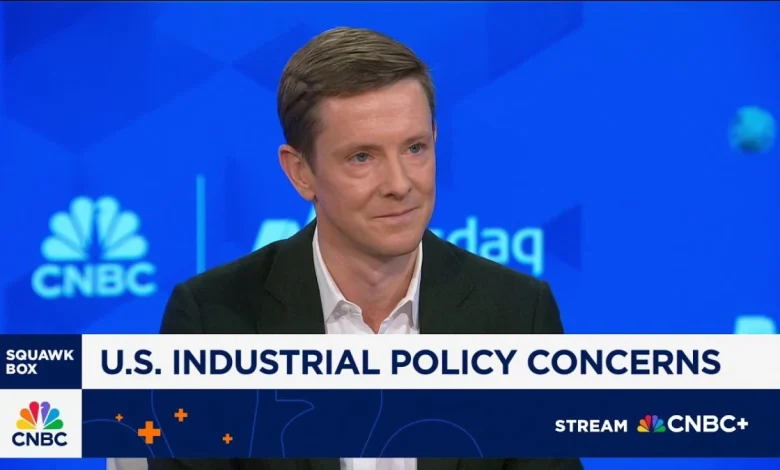Industrial Policy: The Peril of Rule by Deal

November 11, 2025, 5:45 pm IST
The current American approach to industrial policy, characterized by individualized negotiations rather than a coherent strategy, risks becoming a system of “rule by deal.” This was the central critique offered by Chris Hughes, Facebook co-founder and Economic Security Project co-chair, during a recent interview on CNBC’s Squawk Box. Hughes argued that the trend, visible across various sectors from semiconductors to rare earths, is less about economic nationalism or state capitalism and more about a transactional method of government intervention.
Hughes, discussing his piece in The American Prospect, engaged with the CNBC hosts on the implications of the Trump administration’s industrial and tariff policies, as well as the government’s potential role in AI data center investment. His core concern revolved around the lack of transparency and strategic foresight in these bespoke arrangements.
He elaborated, stating, “I see a group of dealmakers… going one by one, picking winners and losers.” This ad-hoc approach, he contended, allows specific companies with direct access to the White House to secure significant public investment and private capital influx, often without thorough consideration of market dynamics, competitive landscapes, or broader industrial policy goals. The absence of transparency and accountability in these processes, he warned, can lead to inefficiencies and skewed market outcomes.
While acknowledging the national security imperatives driving some interventions, particularly in critical sectors like rare earths and semiconductors where China’s dominance poses significant challenges, Hughes stressed the need for a more structured framework. The interviewer highlighted that areas like rare earths could take five to seven years to rebuild domestic supply chains, underscoring the urgency.
Hughes advocated for a comprehensive, institutional approach to industrial policy. “We need to have a comprehensive, institutional approach,” he asserted, suggesting that such a strategy would involve a clear mission, an established institutional capacity to execute it, and a transparent process for allocating resources. He pointed to the CHIPS Act as an example that, despite its slow implementation, offered a template for strategic public investment. The CHIPS Act, designed to bolster domestic semiconductor manufacturing, committed $34 billion to incentivize major manufacturers to open new fabrication plants in the U.S. While the rollout has been protracted, as the interviewer noted and Hughes conceded it “should have been half that” in terms of time, it represents a more programmatic effort than isolated deals.
This deliberate, institutional method stands in stark contrast to what Hughes described as a system where “your buddy called you up and you know somebody” leads to substantial government backing for specific firms, such as an $80 billion allocation for Westinghouse or the suspension of export controls for Nvidia. Such informal dealings risk enriching particular private market actors and misallocating public and private capital, creating a distorted economic landscape. This, he argued, is the very fear that has long plagued discussions around industrial policy.
The conversation then turned to the burgeoning field of artificial intelligence and the role of government. When asked about OpenAI’s recent suggestion for government investment in data centers, Hughes was unequivocal. He found the idea “pretty rich,” given the immense private capital already flowing into the AI ecosystem. “When you see an industry with that much private capital rushing in, that’s the exact moment where public capital should lean back,” he stated firmly. He expressed concern about the potential for a bubble in the AI space due to this influx, advising government to monitor national security implications rather than directly invest in areas already saturated with private funding.
On the topic of tariffs, Hughes drew a clear distinction between sweeping, across-the-board tariffs and targeted measures. He argued that broad tariffs, affecting everything from automobiles to avocados and luxury goods, are detrimental. “The kinds of tariffs that I don’t think make any sense are these kind of sweeping tariffs across all imports… I think that’s a bad thing for trade… and makes little sense,” he observed, highlighting their negative impact on economic growth and consumer prices. While acknowledging that targeted tariffs, like those imposed by the Biden administration on Chinese electric vehicles, can serve specific public policy goals, he maintained that a blanket tariff approach is counterproductive and ultimately harms consumers.





